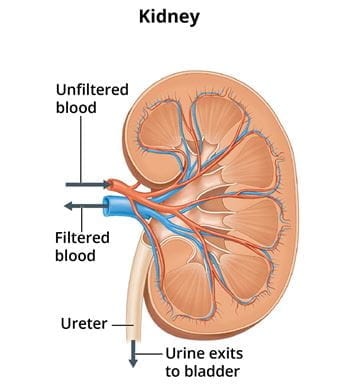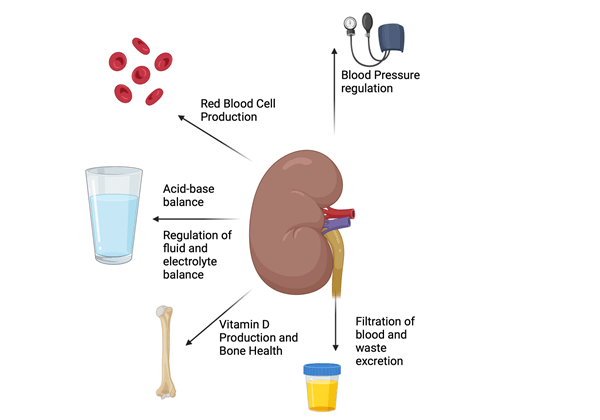 The kidneys are located on either side of the spine, just below the ribcage. Usually a person has two kidneys, which are formed early during pregnancy. The kidneys play a crucial role in maintaining the body's overall health by performing several important functions:
The kidneys are located on either side of the spine, just below the ribcage. Usually a person has two kidneys, which are formed early during pregnancy. The kidneys play a crucial role in maintaining the body's overall health by performing several important functions:
-
Filtration of blood: The primary job of the kidneys is to filter waste products, fluids, and toxins from the bloodstream. In adults, the kidneys process around 120 to 150 quarts of blood and produce 1-2 liters of urine every day. The amount of urine made each day is smaller in children and babies.
-
Regulation of Fluid and Electrolyte Balance: The kidneys help to balance water and electrolytes (such as sodium, potassium, calcium, and phosphorus) in the body. They help keep substances needed in the body while excess amounts are lost in urine.
-
Acid-Base Balance: The kidneys help maintain the body's pH level, which is needed for functioning of enzymes and other cell processes.
-
Blood Pressure Regulation: The kidneys help control blood pressure by adjusting the amount of water and salt in the bloodstream. They also make hormones which are involved in regulating blood pressure.
-
Red Blood Cell Production: The kidneys make a hormone called erythropoietin, which helps the bone marrow make red blood cells. Red blood cells are responsible for carrying oxygen throughout the body.
-
Activation of Vitamin D: The kidneys activate vitamin D, which is needed to absorb calcium in the stomach. This helps to keep bones healthy.
-
Waste Excretion: Besides filtering waste products from the bloodstream, the kidneys release them from the body through urine.
Overall, the kidneys play a vital role in ensuring the body's internal environment remains stable and functional. If the kidneys are not functioning properly, waste products and excess fluids can build up in the body, leading to various health issues.
